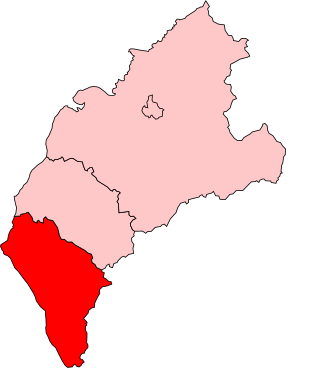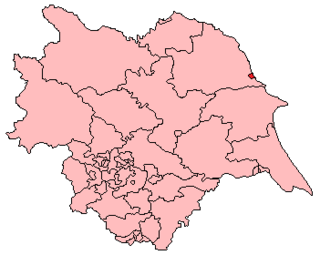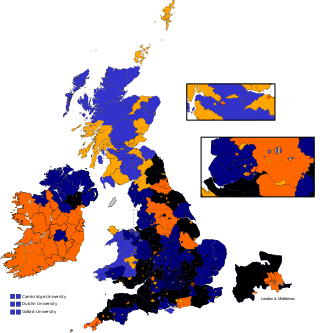Morpeth was a constituency centred on the town of Morpeth in Northumberland represented in the House of Commons of the Parliament of England from 1553 to 1707, the Parliament of Great Britain from 1707 to 1800, and then the Parliament of the United Kingdom from 1800 to 1983.
Ashburton was a borough constituency represented in the House of Commons of the Parliament at Westminster, for the Parliaments of 1295 and 1407, and regularly from 1640 until it was abolished for the 1868 general election. It was one of three Devon borough constituencies newly enfranchised in the Long Parliament. It returned two Members of Parliament until the 1832 general election when the number was reduced to one MP.

Whitehaven was a constituency centred on the town of Whitehaven in Cumberland, which returned one Member of Parliament (MP) to the House of Commons of the Parliament of the United Kingdom.
Hastings was a parliamentary constituency in Sussex. It returned two Members of Parliament to the Parliament of England until 1707, Parliament of Great Britain before 1801 and the House of Commons of the Parliament of the United Kingdom until the 1885 general election, when its representation was reduced to one member. It was abolished for the 1983 general election, when it was partially replaced by the new Hastings and Rye constituency.
Hertford was the name of a parliamentary constituency in Hertfordshire, which elected Members of Parliament (MPs) from 1298 until 1974.

Scarborough was the name of a constituency in Yorkshire, electing Members of Parliament to the House of Commons, at two periods. From 1295 until 1918 it was a parliamentary borough consisting only of the town of Scarborough, electing two MPs until 1885 and one from 1885 until 1918. In 1974 the name was revived for a county constituency, covering a much wider area; this constituency was abolished in 1997.
Rye was a parliamentary constituency centred on the town of Rye in East Sussex. It returned two Members of Parliament to the Parliament of England before 1707, Parliament of Great Britain until 1801 and the House of Commons of the Parliament of the United Kingdom until its representation was halved under the Reform Act 1832.
Bury was a borough constituency centred on the town of Bury in Lancashire. It returned one Member of Parliament (MP) to the House of Commons of the Parliament of the United Kingdom.
Egremont was a parliamentary constituency centred on the town of Egremont in Cumberland. It returned one Member of Parliament (MP) to the House of Commons of the Parliament of the United Kingdom, elected by the first past the post system.
Brighton was a parliamentary constituency of the House of Commons of the Parliament of the United Kingdom from 1832 until it was divided into single-member seats from the 1950 United Kingdom general election. Covering the seaside towns of Brighton and Hove in East Sussex, it elected two Members of Parliament (MP) by the block vote system of election.

East Cumberland is a former county constituency in the House of Commons of the Parliament of the United Kingdom. It elected two Members of Parliament (MPs) by the bloc vote system of election.

West Cumberland was a county constituency in the House of Commons of the Parliament of the United Kingdom. It elected two Members of Parliament (MPs) by the bloc vote system of election.
Monmouth Boroughs was a parliamentary constituency consisting of several towns in Monmouthshire. It returned one Member of Parliament (MP) to the House of Commons of the Parliaments of England, Great Britain, and finally the United Kingdom; until 1832 the constituency was known simply as Monmouth, though it included other "contributory boroughs".
Launceston, also known at some periods as Dunheved, was a parliamentary constituency in Cornwall which returned two Members of Parliament to the British House of Commons from 1295 until 1832, and one member from 1832 until 1918. It was a parliamentary borough until 1885, and a county constituency thereafter.
Swansea District before 1885 also known as Swansea District of Boroughs was a borough constituency. It was represented in the House of Commons of the Parliament of the United Kingdom. It elected one Member of Parliament (MP) by the first past the post system of election.
Boston was a parliamentary borough in Lincolnshire, which elected two Members of Parliament (MPs) to the House of Commons from 1547 until 1885, and then one member from 1885 until 1918, when the constituency was abolished.
Droitwich was the name of a constituency of the House of Commons of England in 1295, and again from 1554, then of the House of Commons of Great Britain from 1707 to 1800 and of the House of Commons of the Parliament of the United Kingdom from 1801 to 1918. It was a parliamentary borough in Worcestershire, represented by two Members of Parliament until 1832, and by one member from 1832 to 1885. The name was then transferred to a county constituency electing one MP from 1885 until 1918.
Wilton was the name of a parliamentary borough in Wiltshire. It was represented in the House of Commons of the Parliament of England from 1295 to 1707, then in the Parliament of Great Britain from 1707 to 1800 and finally in the House of Commons of the United Kingdom of the Parliament of the United Kingdom from 1801 to 1918. It had two Members of Parliament (MPs) until 1832, but from 1832 to 1885 only one member, as a result of the Reform Act 1832 where it also absorbed the former rotten borough of Old Sarum. In 1885 the borough was abolished, but the name of the constituency was then transferred to a new county constituency electing one Member from 1885 until 1918.
Liskeard was a parliamentary borough in Cornwall, which elected two Members of Parliament (MPs) to the House of Commons from 1295 until 1832, and then one member from 1832 until 1885. The constituency was abolished by the Redistribution of Seats Act 1885.
Stoke-upon-Trent was a parliamentary borough in Staffordshire, which elected two Members of Parliament (MPs) to the House of Commons from 1832 until 1885, and then one member from 1885 until 1918, when the borough was enlarged, renamed Stoke-on-Trent, and split into three single-member constituencies.







